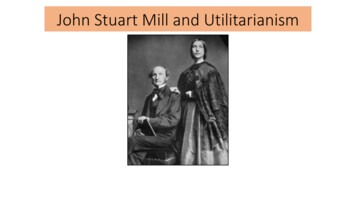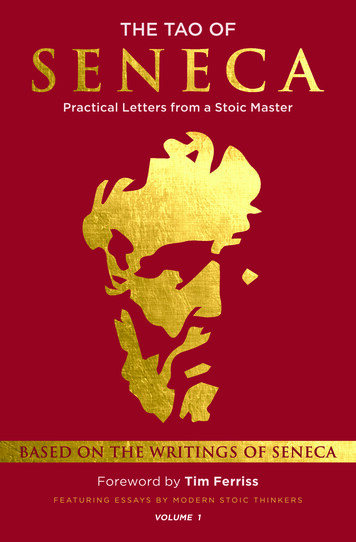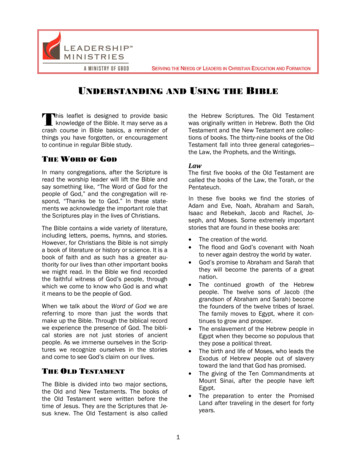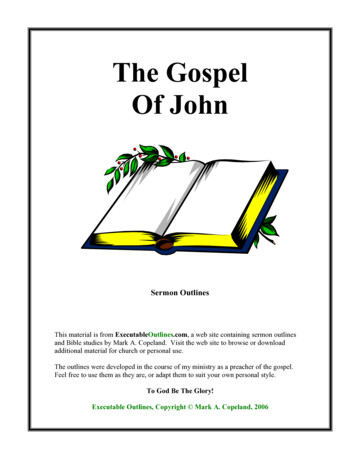
Transcription
John Stuart Mill and Utilitarianism
Utilitarianism Definition Utilitarianism is an example ofconsequentialism, a type of ethicaltheory according to which whatmatters are the consequences of anaction, not its intent. Therefore whether an action is goodor not depends on its outcome orresult, not the means to that endnor the motivation for it
Some precursors The Chinese philosopher Mozi (490-403 BCE):He notes that customs can’t justify themselves.We need some standard to judge them by. Thatstandard is, does the custom lead to morebenefit than harm? The Greek philosopher Epicurus (341-270 BCE):“Pleasure is the goal that nature has ordainedfor us; it is also the standard by which we judgeeverything good”
English backgroundto John Stuart Mill’s Utilitarianism Jeremy Bentham (1748-1832) – an importantpredecessor and influence; he was also a friend of Mill’sfather, so close that Mill asked him to be his son’sgodfather Bentham said that pleasure was the only objectivegood, and pain the only evil Said that right actions result in “good or pleasure;”wrong actions result in pain or absence of pleasure Good consequences are those that result in the greatestamount of pleasure (happiness) for the “party whoseinterest is in question.” Hedonic calculus pleasure and pain are quantifiable.You can measure them according to: intensity, duration,certainty or uncertainty, propinquity (i.e., nearness),fecundity, purity, and extent (number of people)
John Stuart Mill (1806-1873) Brilliant thinker and writer Like Bentham, a social reformer Had a very unique education (he was essentiallyhome-schooled by his father, who started Mill onlearning Greek by age 3 and Latin by age 8; othersubjects like mathematics and logic followed;although Mill was from a large family, he had veryfew opportunities to socialize with other children,which probably contributed to his having a mentalbreakdown at age 20 Mill eventually met Harriet Taylor, a like-mindedsoul; after 20 years of platonic friendship, theymarried in 1850 Taylor had a major influence on her husband’ssupport for women’s rights, including the right tovote, and contributed to several of his writings
Utilitarian principle: Act to promote the greatestgood (happiness) for the greatest number Utilitarianism is “the creed which accepts as the foundation ofmorals, utility, or the greatest happiness principle, holds thatactions are right in proportion as they tend to promotehappiness, wrong if they tend to produce the reverse ofhappiness.” For Mill, happiness is the basic measure of utility, not pleasure Also noteworthy is that Mill is concerned with increasing theamount of general happiness, not with increasing any oneperson’s happiness
Questions of happinessHow is happiness to be defined?1. If by the individual, that leadsto moral relativism orsubjectivism2. By some objective standard?This implies that there isanother standard that servesas the basis for utilitarianism
Mill questions Bentham’s claim that thepleasures are all equal. Mill tries to refine Bentham’s theory Mill says that all pleasures are not equal;some are noble, others base For example, intellectual pleasures likeenjoying poetry are superior to lowerkinds of experience, those associatedwith the body such as food or sleep In assessing pleasures, we should takeinto account quality as well as quantity Some pleasures are more in keepingwith what is good for us Mill: “Better to be Socrates dissatisfiedthan a fool satisfied”
Rule utilitarianism vs. act utilitarianism Mill is generally considered to be an advocate of what latercame to be known as rule utilitarianism, as opposed to actutilitarianism Rule utilitarians look at the consequences of having everyonefollow a particular rule and calculate the overall utility ofaccepting or rejecting the rule; they want to establish rules thatlead to greater pleasure or happiness in the long run; they thinkthat following at least some rules is more practical than havingto calculate the utility of an act every time it is contemplated orperformed; an example of one such rule: one should always tellthe truth Act utilitarians look at the consequences of each individual actand calculate the utility each time the particular act isperformed; the reason for this can be seen in the followingexample: if on one day lying will lead to more happiness, oneshould lie, whereas if on another day, telling the truth leads tomore happiness, one should tell the truth
Rule utilitarianism: Three levels of rules(according to Louis Pojman and James Fieser, writing aboututilitarians in Ethics: Discovering Right and Wrong) First order: Rules of thumb which are alwaysto be followed (since they generally maximizeutility) unless one rule of thumb comes intoconflict with another rule (For example, “Donot steal,” “Do not lie,” or “Doctors shouldnever intentionally harm a patient”) Second order: A set of rules for resolvingconflicts between rules of thumb (e.g., “it ismore important to avoid causing serious harmthan to tell the truth”) Third-order: When no rule applies, simply dowhat your best judgment tells you will lead tothe greatest utility or pleasure or happiness(Rule utilitarianism gives way here to actutilitarianism)
Some problems with utilitarianism 1. It promotes a kind of cost-benefit analysis to morality (but do suchissues as slavery, the sale of body organs, or ecological ethics get treatedjustly by this approach?) 2. How can it be consistently applied? Are there not sometimesexceptions? Is it not difficult to measure or quantify pleasure andhappiness? 3. It is concerned only with ends; it does not attach much if any moralsignificance to the means used to achieve the end. So as long as a courseof action produces the greatest possible benefit, utilitarianism does notcare whether the benefits are produced by lies, torture, or other kinds ofdishonest behavior 4. We don’t always know the consequences of our actions; it is hard topredict the future 5. It discriminates against minorities; only the majority seems to matter(see the greatest happiness principle) 6. It is relativistic since it seems to endorse different rules or modes ofbehavior for different societies
A test case for utilitarianism: the use ofatomic weapons at the end of WWII Many innocent civilians died as theresult of the dropping of theatomic bomb on Hiroshima andNagasaki. Was a greater good served by thetens of thousands who died? Or is killing the innocent alwayswrong, no matter what theconsequences? What would a utilitarian say? What would you say?
Another test case: the Ticking bomb A terrorist is captured, together withinformation showing his involvement in aplot to blow up downtown New York Cityor Washington D.C. with a nuclear bombset to detonate in a few hours. The onlyway to find the location of the bomb tostop hundreds of thousands if notmillions of people from dying may be totorture the terrorist. Would it be wrongto do so? For you, is “Do not torture” an absoluterule with no exceptions? That is what theUnited Nations Convention againstTorture says. Do you agree?
utilitarians in Ethics: Discovering Right and Wrong) First order: Rules of thumb which are always to be followed (since they generally maximize utility) unless one rule of thumb comes into conflict with another rule (For example, “Do not steal,” “Do not lie,










